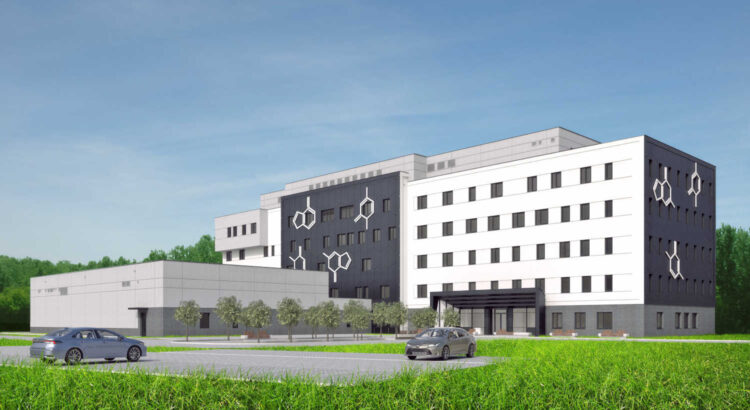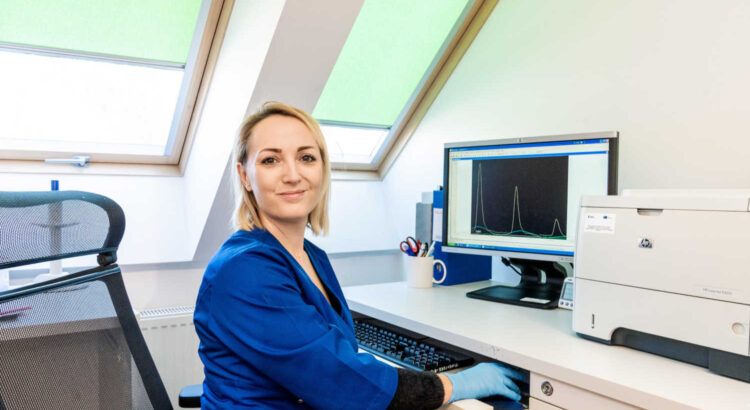New headquarters of the Institute of Animal Reproduction and Food Research of the Polish Academy of Sciences in Olsztyn is nearing completion. The end of works is scheduled for October this year. The facility will gather all the Institute’s units, which today are scattered in four locations in two cities. Another advantage of the new location is its proximity to the science and technology park.
– Finally, we will all be together in one place. This will improve cooperation between scientists, increase the potential of our centre and create optimal conditions for innovative research. It is also an opportunity to integrate all employees – daily meetings strengthen the sense of community. Synergy, synergy and more synergy – underlines the Director General of IARFR PAS in Olsztyn, Prof. Mariusz Piskuła.
The director adds that a single headquarters also means simpler management of the Institute and puts an end to logistical problems (e.g., the need for constant transportation of documents and reagents or „wandering” of employees between locations). – In addition, we will reduce the Institute’s maintenance costs, since the maintenance of a single building made with the latest energy-efficient technologies will be cheaper than the current total cost of maintaining all workplaces – points out Prof. Piskuła.
The location in the neighbourhood of the Olsztyn Science and Technology Park is not accidental. – The current trend in the global science puts a spotlight on the usefulness of science and the translation of research results directly to the benefit of people and the quality of their life. The new location is therefore an incredible opportunity for us to transfer science into practice and to develop research and implementation projects – adds Prof. Piskuła.
CURRENT WORKS
The works on the construction site on Władysław Tryliński St. in Olsztyn are in progress. – So far, we are implementing various stages without major problems. Currently, we are carrying out activities related to all internal installations, also the elevation work is underway, and activities on the landscaping are slowly beginning. The work at the Animal Laboratory is progressing faster, as this place – designed and built to the highest world standards – will be finished earlier due to complicated inspection procedures – says Deputy Director for General Affairs Michał Żurek.
The building has six floors (including one technical floor), with a total area of more than 10,000 square meters. Inside there will be laboratories, rooms for specialized analytical work, seminar rooms, a Scientific Council room, and administrative and technical facilities. Larger events will be held in the halls of the Olsztyn Science and Technology Park. A relaxation area is also planned.
Thanks to the BMS (Building Management System), the Institute’s new building will be largely automated. – Also noteworthy is the new conference room, which will be equipped with a state-of-the-art audiovisual system, allowing for hybrid meetings and online connection with guests or speakers – points out Michał Żurek.
The investment also includes access roads, parking lots, a covered shelter for bicycles and landscaping. A photovoltaic installation will be built next to the building.
BEFORE THE FINAL MOVE
The construction is scheduled for completion in October this year. Then the moving will begin, which will take several months due to the need to properly transport highly specialized equipment and adapt the laboratories. It’s also an extensive planning effort and the actual transport of animals from the Animal Lab.
The Institute plans to vacate its current locations by August 2024, and the current buildings will be put up for sale.
NEW HEADQUARTERS – HOW IT ALL STARTED
Currently, IARFR PAS in Olsztyn is spread out, with its divisions and departments located in four locations, in two cities. The Division of Food Sciences is located in Olsztyn on Tuwima Street, the Division of Reproductive Biology is located on Bydgoska Street in Olsztyn. In Białystok, we have a department dealing with the prophylaxis of metabolic diseases and the department for human reproductive pathology, located in the Science and Technology Park and the Medical University, respecively.
Plans to build a new headquarters for the PAS Institute date back to 2011. In 2013, the Institute signed a letter of intent with the city – the operator of the Olsztyn Science and Technology Park – about its desire to locate a scientific facility there. In 2015, the Institute bought a 2.2-hectacre parcel in the immediate vicinity of the Park, where a new headquarters is being built. Construction began in December 2021.
– Throughout the history of the implementation of this investment, we have received tremendous support from the authorities of Olsztyn, the local government of the Warmian-Masurian Voivodeship, the Ministry of Science and Education and politicians from our region. Our project is a very good example of successful cooperation for a common goal – emphasizes Prof. Mariusz Piskuła.
The headquarters is being built under the design-build formula, which means that the contractor, Budimex company, has prepared the project and is implementing it on the basis of the functional-utility program developed by the Institute.
The entire project is an investment planned for more than PLN 95 million. The war in Ukraine and price skyrocketing have escalated its cost by more than PLN 10 million. Funding of more than PLN 79 million comes from EU funds – from the Regional Operational Program of the Warmian-Masurian Voivodeship for 2014-2020.
The construction of the Institute’s new headquarters is being carried out as part of the „Center for Environmental Research and Innovative Food Technologies for Quality of Life” project, co-financed by the European Regional Development Fund under the Regional Operational Program of the Warmian-Masurian Voivodeship for 2014-2020.







